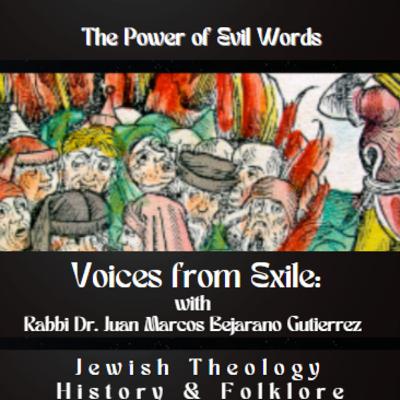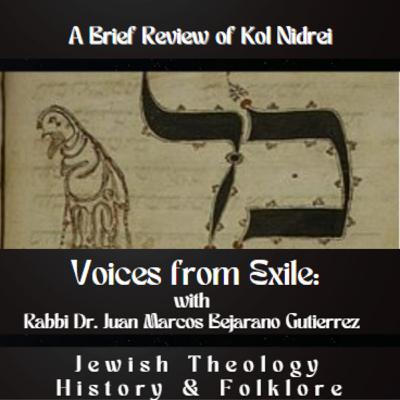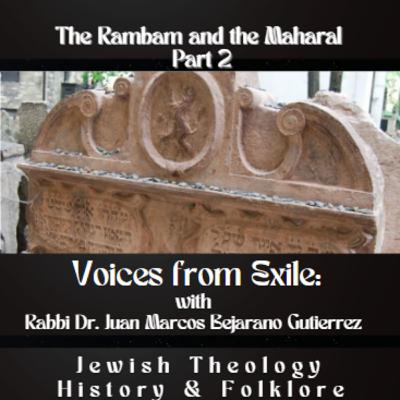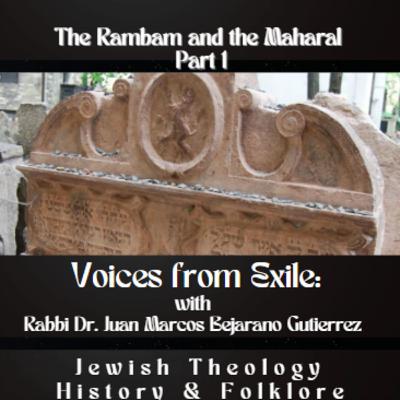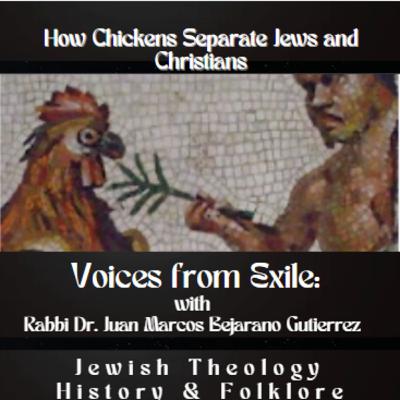Discover Voices from Exile: Delving into Jewish Theology, History, and Folklore
Voices from Exile: Delving into Jewish Theology, History, and Folklore

Voices from Exile: Delving into Jewish Theology, History, and Folklore
Author: Rabbi Dr. Juan Marcos Bejarano Gutierrez
Subscribed: 1Played: 5Subscribe
Share
Description
The Jewish experience is far more diverse that many people imagine. The long history of the Jewish people is shaped by theology, history, and folklore. Join us on this heartfelt journey to explore a wide range of topics from various perspectives in the quest to appreciate the beauty and complexity of Judaism and the Jewish people.
36 Episodes
Reverse
Rabbi Sherwin once related that during the medieval period, “…the Jew was viewed by the Christians as demonic, anti-Christ, criminal, blasphemous, heretical and either blind or stubbornly recalcitrant to Christian truth. The Jew was neither considered to believe in or to worship the true God. Rather, the Jew was considered to be an agent, an ally and a worshipper of Satan.” While I have experienced many things, I encountered this with someone I thought was an old friend.
I think it's safe to say that in most people's mind, fasting, long services, and certainly Kol Nidrei are generally connected with what people think about Yom Kippur. But the actual history of the Kol Nidre is often a mystery to many Jews. It's often assumed to be linked to forced conversions. And there may in fact be some truth to that. But the sources are not altogether clear. This short episode explores some key concepts about it.
The views of the Rambam and the Maharal were far apart on many issues. In this episode we continue the discussion regarding their perspectives on Jewish identity. They demonstrate the variety of entrees at the theological Smorgasbord that constitutes Jewish theology. Rabbi Abraham Joshua Heschel was once asked to explain the Jewish view on a particular topic. Rabbi Heschel explained that there was not a single Jewish view. Judaism, he explained, was like a deep river with many streams and many tributaries.
Anyone even remotely familiar with the Talmud will note the routine exchange or dialogue that takes place between rabbis. The rabbis are often from different periods, but the conversations add to the understanding and elaboration of the tradition. The conversation, in that sense, is very much alive.
That model has always drawn me, and I believe it shows the complexity of the classical Jewish tradition to entertain and present perspectives alongside each other that may provide the exact opposite view. What about if we could hear great rabbis of Judaism discuss issues that concern us today by inviting them to our dinner table? We may be not able to do that, but we can construct an imaginary conversation based on their views on various topics. Our concern is on their views on Jewish identity and the non-Jewish world.
The famous story of the Greek Philosopher Socrates might not seem to mean much in the world of Jewish and Christian interfaith dialogue, but should it? Jews and Christians share much in common and differ sharply in other areas. What is the root of the differences? Is it simply a matter of beliefs or are there fundamental differences in how they understand knowledge?
The first chapter of the book of Genesis recalls the story of creation. But it provides far more than merely an Israelite cosmology. It offers an understanding of Near Eastern cosmologies or the remnants of the former still existent in Israelite society's memory. Genesis conveys the concept of the one God created the world according to His will, without restraint or limitation. It provides the foundation for Jewish theology.
Several months ago, I was traveling to Canada on business for my engineering job. I had finished my meeting and was at the airport ready to return to the US.
As I was sitting down eating a snack, I heard my wife’s voice loud and clear. She called “Mi amor” in Spanish, meaning my love. I didn’t turn around to see if she was there. I knew she was at home with our three boys. I reached for my phone and texted to her to see if she was ok. She told me had been having a difficult time with our youngest son who is on the autism spectrum and had been frustrated. She had called out to me in a moment of frustration. I have never had that happen before, but I have heard of similar occurrences. A family I know one finished each other's dreams if that makes sense, and I have heard of visitations from loved ones just before they pass. But I had never had something like this happen to me. So, I became curious and wanted to see what if anything do Jewish sources comment on this type of occurrence.
he mystical experiences of Abraham Abulafia of the 13th century are categorized under the label of prophetic or ecstatic Kabbalah. In prophetic Kabbalah, the goal of the mystic is to attain a spiritual experience on par with that of the biblical prophets. In the person of Abulafia, ecstatic Kabbalah, apocalypticism, and messianism reached a unique synthesis. Abulafia saw himself as a Messianic figure with visions of apocalyptic wars and experiential encounter reminiscent of the biblical prophets.
The principal story of Parashat Toldot centers on the birth of Isaac’s two sons, Jacob and Esau. Their birth serves to convey G-d’s fidelity to the promises he made to Abraham to provide him future descendants to inherit the land of Canaan. Yet the lives and decisions of both Jacob and Esau also cause to consider the age-old question of free will and predestination- that is whether man possesses the ability to initiate and determine his own future and destiny through his own choices.
The rabbis of late antiquity performed various roles in Jewish religious and civic life. The rabbis of Babylonia, like their counterparts in the land of Israel, were seen as or functioned as holy men , sages, mystics , exorcists , lawyers, judges, and as community organizers. The rabbis were honored and feared by many, but they were also despised and rejected by others. Their authority is often overstated and was only valid for those willing to support their enactments.
The rabbis crossed hereditary, financial, and social classes and based their authority on their mastery of Torah knowledge. Their power was significant in many ways and incredibly limited in others. In the end, rabbinic authority was limited by the extent to which the local populace accepted their jurisdiction and the degree to which the Persian and Roman ruling authorities allowed them to operate.
The differences between Ashkenazim and Sephardim of the medieval period extend to a whole host of areas including their liturgical practices, approaches to the Biblical and Talmudic study, manner of dress, and of course differences in Hebrew pronunciation. The differences often resulted in identity struggles which manifested themselves in conflict and animosity towards each other. The differences were in part reflective of very different cultural surroundings and the impact of the dominant political and religious cultures of Christianity and Islam.
Theological debates between two different theological systems are generally pointless in my opinion. Why? Because typically the nature of each theological system generally dismisses the validity of the other theological system from the start. One side is bent on showing the other how wrong or foolish they are. If theological debates are pointless, then what is appropriate and what is beneficial. Discussion. A genuine theological discussion affords each the legitimacy of each tradition for its adherents. A discussion doesn't mean approbation, acceptance, or even admiration. It simply means that we try to understand each other.
A number of Jewish historical works were written during the sixteenth century including Sefer Yuhasin by Abraham Zacuto at the beginning of the century and Semah David by David Gans at the end of the century. The former preceded Dei Rossi’s Me’or Einayim and was intended for the accomplished Talmudic scholar while the latter was intended for the masses.3 While they differ in content and theme, both of these historical works emphasized the precise knowledge of the rabbis with the underlying goal of preserving the authority of the tradition. Zacuto’s work affirms the literal truth of all rabbinic accounts, including those with a legendary or mythical tone to them. For Zacuto, history is not an end in itself but must instead serve to strengthen trust in G-d’s power and providence. The history of the Jewish people fulfills the words of the Torah to “remember the days of old.” Both works include a review of non-Jewish history but view it as separate, and both works view any disagreements or discrepancies between Jewish sources and non-Jewish sources are decided by the former.4 For Gans, writing after Dei Rossi and in response to many of his stances, any account that did was not divinely inspired could not be trusted absolutely. Like Zacuto, Gans affirmed the position rejecting any historical source that contradicted or called into question even the smallest detail of Talmudic Aggadah.
A great many Jewish holidays and practices, in their earliest understanding, reflect the great innovation of Israelite religion. The Bible emphasized historical events in contrast to nature. Other ancient Near Eastern religions stressed the latter. As Rabbi Abra-ham Joshua Heschel noted, in the Jewish tradition, faith is memory. The observances of Jewish holidays and various Jewish practices articulate theological ideas reflective of collective Jewish memory.
It's hard to believe that Hasidism as we see it in the 21st century was once considered heretical in quarters of traditional orthodoxy. The rise of Hasidism precipitated a strong reaction by a range of prevailing religious authorities. The accusations and basis for concern were quite varied as the edicts of excommunication issued by the Gaon of Vilna and others ultimately revealed. One recurring accusation against the growing number of Hasidim was the deprecation of Torah study among its adherents. The accusation levied against Hasidism eventually dissipated in the 19th century, but such assertions plagued the origins of the movement during its first and second generation.
The Sayings of the Fathers provide us with a unique but limited portal to the world of emerging rabbinic thought in the late Second Temple and the subsequent era following its destruction. While the Sages’ words are primarily focused on ethical and moral concerns, they also reflect the complex and changing political environments of their day and the delicate relationship existing between Jewish communities in a post-exilic world dominated by foreign powers.
Despite the proven relationship of Karaites and Rabbanites at the highest level, the theological differences between the two communities remained and would ultimately manifest itself in attempts by some Rabbanites to excommunicate them. But while some worked to excommunicate them, others were perfectly fine with forging alliances and marrying them.
While the two groups may have been theological opposed to each other, day to day interaction could include practical engagement with one another. If documented relationships that existed between Karaites and Rabbanites, i.e., rabbinic Jews, can be explained as simple business realities, the associations between the Karaites and the yeshivot of Jerusalem and Babylon reveal an astonishing measure of cooperation and support.
We continue our discussion on Moshe idel's work titled Ben: Sonship and Jewish Mysticism. Here Idel begins to consider the elements which appear to have been critical in the development of the thought patterns that were eventually accepted into nascent Christianity. While our discussion will not reach this period yet, these elements are critical to understanding the existence of various ideas that reappear in later Jewish thought in the medieval period.
We continue our discussion the phenomenal and no doubt controversial work of Moshe Idel titled Ben: Sonship and Divine Sonship and Jewish Mysticism. In this episode we explore the challenges of understanding sonship in the Second Temple period with an emphasis on the Angel of the Lord. The goal of this discussion is to understand the variety of Jewish thought on the topic and also understand the point of departure between emerging rabbinic thought and nascent Christianity.


